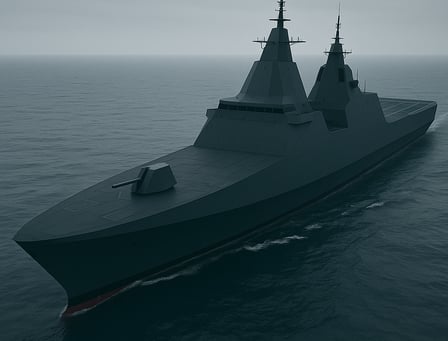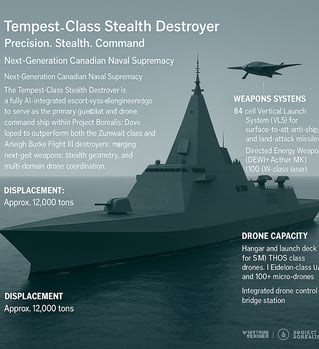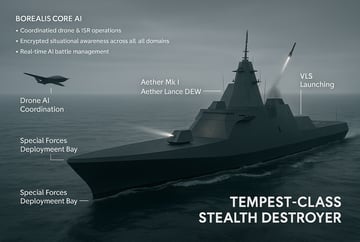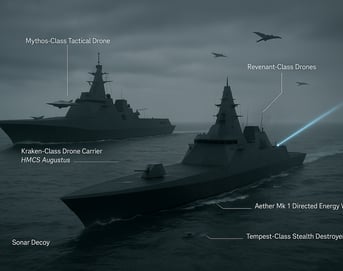Tempest-Class Stealth Destroyer
Precision. Stealth. Command.
Next-Generation Canadian Naval Supremacy
The Tempest-Class Stealth Destroyer with a planned displacement of 12,000-14,000 tones is a fully AI-integrated escort vessel engineered to serve as the primary guardian and escort of the Kraken Class Drone Carrier command ship within Project Borealis. Developed to outperform both the Zumwalt-class and Arleigh Burke Flight III destroyers, the Tempest is a symbol of Canada’s naval innovation—merging next-gen weapons, stealth geometry, and multi-domain drone coordination in a single combat platform.


Key Features
1. Stealth Hull Design
Angular, faceted stealth geometry
Radar-absorbing materials (RAM)
Infrared suppression systems
Low thermal & acoustic signature
Minimal radar cross-section (similar to or exceeding Zumwalt levels)
96 VLS
Anti-submarine offensive capabilities
2. Propulsion & Power
Integrated Electric Propulsion (IEP) system
Small Modular Reactor (SMR) → Extended endurance, near-limitless range
Near-silent cruising with battery-electric modes
3. Electronic Warfare & Cyber
Full-spectrum EW suite: jamming, spoofing, electronic deception
Signal Intelligence Relay Node (SIRN) integration for Project Borealis networking
Offensive cyber capability integration
Adaptive electronic signature obfuscation (chameleon-like active EM profile management)
4. Sensors & ISR
Vigilis Integration: Linked to micro-drone and UAV swarms
Multi - band AESA Radar Arrays (stealth flush-mounted)
360° EO/IR and passive sensor arrays
Subsurface sonar arrays (bow, hull-mounted, towed array for ASW)
5. Air & Drone Capabilities
Hangar and deck space for:
MYTHOS-Class drones (Sylph-1 & Sylph-2)
Phantom Halo micro-drone swarms
Revenant-class UCAV control integration


Borealis Core Integration
The Tempest-Class is equipped with a fully networked Borealis Core AI node, allowing it to:
Act as a fleet synchronization hub
Execute autonomous threat assessments and countermeasures
Coordinate real-time drone ISR, target acquisition, and loitering munition launches
Maintain silent operations via encrypted data relays and stealth envelope control
Aviation & Special Forces Support
Flight Deck: Accommodates up to 2 medium helicopters
Drone Launch Capabilities: Forward launch/recovery systems for stealth UAVs
Special Operations:
Onboard facilities for SOF teams
Fast-launch RHIBs and amphibious drone transport capability
Medical stabilization and mission planning quarters


Strategic Role
Escort and defend Canadian or Allied surface combatants
Conduct Arctic and blue-water patrols
Enable distributed drone warfare and AI-led threat mitigation
Intercept and neutralize missile, sub-surface, and airborne threats
Deliver tactical strike and force projection in joint NATO or CANZUK operations
Technological Edge
Stealth Geometry: Angular hull with radar-absorbing materials
ASW Suite: Advanced sonar, acoustic decoys, and drone-linked sub-hunting tools
DEW Suite: Energy-based threat interception
Self-Healing Camouflage (future-ready): Visual and IR suppression with adaptive polymer skin

